As a patient-advocate you must learn to identify the various
stages of grief as you help the family cope with their loss
Talking
about death is never easy. In A Grief Observed, author C.S. Lewis writes
about his experience of his wife’s death, “No one ever told me that grief felt
so like fear. I am not afraid, but the sensation is like being afraid. The same
fluttering in the stomach, the same restlessness, the yawning, I keep on
swallowing. At other times it feels like being mildly drunk or concussed. There
is a sort of invisible blanket between the world and me. I find it hard to take
in what anyone says... Yet I want the others to be about me.”
Everyone
experiences bereavement at some point in life, but when it’s sudden and
unexpected, the loss can be tremendous. The news can come as a big shock,
completely throw a person off-balance and overwhelm him by a rush of emotions.
As a patient-advocate, you can lessen someone’s grief by bearing in mind the
following principles of care:
Contact relatives promptly and stay with the family throughout,
while liaisoning with the rest of the medical and nursing team.
Make available special provisions for the bereaved family,
including a quiet place to mourn, and help them access spiritual support.
When
bad news is delivered, it must be done gently and honestly, avoiding euphemism
and long-winded medical explanations.
Provide
both verbal and written information to the survivors: what to do next; mortuary
procedures, possibility of a post-mortem examination; organ donation, if the
family is interested or the deceased had expressed that wish; and details about
grief counselling; and follow-up.
Grief
creates a whirlwind of emotions, and can be a highly traumatic and devastating
experience for some, leaving them incapacitated to deal with the reality of the
situation. This is when an advocate’s help is needed the most.
The
various stages of grief
As a
patient-advocate you must learn to identify the various stages of grief as you
help the family cope with their loss. In her pioneering 1969 book On Death
and Dying Elisabeth Kübler- Ross identifies the following five stages of
grief:
Denial
Anger
Bargaining
Depression
Acceptance
The
intensity and duration of each stage depends on the significance of the change
or loss, and also the survivor’s personal resilience. Patient-advocates should
use the following eight-step framework to help bereaved families:
Select
an appropriate setting
Contact
the family
Prepare
to speak to the family
Tell
them about the death, as gently as possible
Study
their reactions
Allow
them to view the body and stay close to them
Co-ordinate
the respectful handling of the deceased’s body
99Assist them in follow-up actions, such as
organ donation, arranging the post-mortem, getting the death certificate,
preparing for the cremation, and so on.
Notifying death
Breaking bad news is one of the most difficult and sensitive tasks
that healthcare professionals have to perform, and poor communication skills
can leave families confused, angry, scared and scarred. Patient-advocates must
avoid elaborate euphemisms. Equally harsh in the Indian context are words such
as dead or died. Use soft phrases such as “he has passed on,” “he has slipped
away” and “we have lost her” and deliver those words sensitively.
The above is an extract from Dr.Aniruddha Malpani's book : Patient Advocacy - Giving Voice to Patients
The book launch will take place on Saturday, 16 November 2013 at Hall of Harmony, Nehru Center, Worl, Mumbai - 400018 during the 4th Annual Putting Patients First Conference.
The above is an extract from Dr.Aniruddha Malpani's book : Patient Advocacy - Giving Voice to Patients
The book launch will take place on Saturday, 16 November 2013 at Hall of Harmony, Nehru Center, Worl, Mumbai - 400018 during the 4th Annual Putting Patients First Conference.





No comments:
Post a Comment